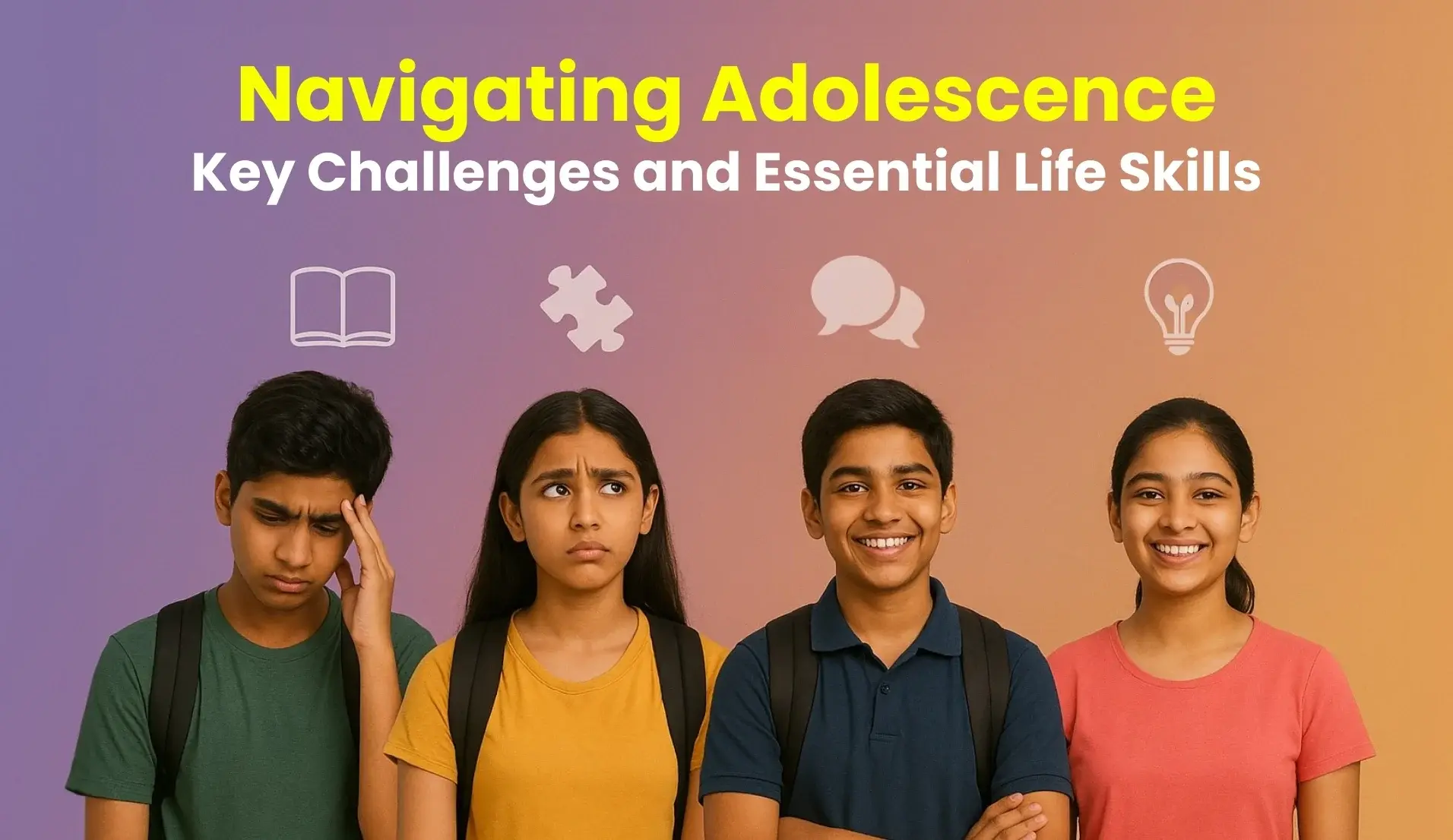Introduction
Adolescence is a period that comes in every person's life. Children from the ages of 10 to 19 are generally referred to as adolescents. These adolescents are growing up in a rapidly transforming world, as technology, migration, climate change, and conflict and are reshaping society, forcing people worldwide to adapt to unexpected changes in their lives and work.
As the world is transforming, the skills and education system are also changing to make these kids capable of facing the challenges of life. These new skills and education will help them perform well in this rapidly growing society.
In this blog, we will talk about the skills that are important for adolescents to learn to face the challenges of society. But first, we will have to learn how an adolescent’s mind works.
Understanding the Adolescent Mind
Brain Development & Emotional Sensitivity
Teen brains are still developing at this stage, so if they feel stressed or anxious about anything, it can cause childhood trauma or depression, which can make them more impulsive.
The brain develops the most at this stage, so if the teens frequently lose their temper around their parents or the people around them, they can still have anger issues even after they grow up.
The Need for Emotional Competence
Adolescence is a time filled with big emotions, from excitement and curiosity to stress and frustration. Learning how to recognize and manage these feelings is one of the most important skills a teenager can develop. When teens build emotional competence, they learn how to:
- Understand their emotions—knowing what they feel and why?
- Express feelings in healthy ways—talking it out instead of shutting down or getting into a shell or lashing out.
- Handle stress and pressure—using calming techniques like deep breathing, meditation, journaling, or exercise.
- Show empathy—respecting others’ feelings and building stronger friendships.
Emotional skills don’t just help with mental health—they also improve school performance, decision-making, and overall confidence. By practicing these skills early, teens create a foundation for healthier relationships and resilience in adulthood.
Essential Life Skills for Overcoming Challenges
1. Stress Management & Self-Care
- Daily Exercise: Most teens face stress in this stage of their lives, and one of the best ways to relieve stress is exercising. Exercising helps an individual to feel stress-free and happy. Any exercise or sport, like weight lifting, swimming, dancing, running, and calisthenics, can help these children feel free while having a fit body.
- Maintain healthy routines: Some healthy habits, like 8 hours of sleep, eating healthy, exercising at least 45 minutes a day, and brainstorming for 30 minutes, can help children to be carefree while growing up.
2. Emotional Regulation & Mindfulness
- Recognizing and naming feelings: Teens nowadays have become numb because of their childhood trauma, and this causes them to forget how they can express their feelings to their parents or friends. That is why parents need to validate what their children feel and teach them how to express their feelings to them with care.
- Use mindfulness techniques: Mindfulness techniques like breathing exercises, meditation, and journaling help children to feel less stressed and more resilient.
3. Problem-Solving, Decision-Making & Goal-Setting
- Problem-Solving: Teens who can break challenges into smaller steps feel less overwhelmed. They learn to look at problems from different angles and find practical solutions instead of giving up.
- Decision-Making: Making good decisions is about weighing options, thinking about consequences, and learning from mistakes. This skill helps teens avoid risky behaviors and build better habits.
- Goal-Setting: Setting clear goals gives teens direction and motivation. When they learn to set realistic, measurable, and time-bound goals, they feel more focused and proud of their progress.
Together, these skills help adolescents become independent thinkers who can adapt, grow, and succeed in school, relationships, and future careers.
4. Communication & Social Skills
- Teaching communication skills to adolescents is an essential skill. How to communicate effectively with your teacher and elderly people. This skill can be mastered in many ways:
- Networking groups: Parents should let their children join networking groups of their interest, which helps them to make new friends and socialize with new people.
- School Clubs: Clubs in schools, like sports clubs or photography clubs, parents should let their children join these clubs to learn something new and make some new friends.
5. Adaptive Behavior & Practical Self-Reliance
As teens grow, they need more than academic knowledge; they need everyday life skills that make them independent and confident. This is where adaptive behavior and practical self-reliance come in.
- Adaptive Behavior: These are the skills that help teens adjust to new situations, whether it’s starting a new school, joining a team, or handling unexpected changes. Flexibility and resilience make it easier to cope with challenges.
- Practical Self-Reliance: From managing personal hygiene and cooking simple meals to budgeting allowance money and keeping track of responsibilities, these skills prepare teens for adulthood.
Putting Skills Into Practice: Actionable Tips
- Daily Check-Ins: Encourage your children to express themselves, and let them share their feelings with you so that they feel comfortable and expressive around you. Even small things like asking about their day can make big impacts and make them feel heard and important, too.
- Mini Mindful Breaks: While studying, use techniques like the Pomodoro technique, which helps your child to take 5-10 minute breaks between studying sessions, and help them relax their mind.
- Problem-Solving with Structure: Help your child create a roadmap that will help them advance in their journey of becoming what they want to be.
- Supportive Conversations: Have small supportive conversations with your child, which relaxes their mind and creates a good image of you in their brain.
- Use Visual Aids: Visual tools are powerful in helping adolescents understand and remember important life skills. Teens often respond better to images, charts, and infographics than to long explanations.
Conclusion
Adolescence is a time of growth, discovery, and challenges. By learning key life skills, such as emotional regulation, problem-solving, communication, and self-reliance, teens can face everyday struggles with confidence. These skills not only reduce stress and improve mental health but also prepare adolescents for success in school, relationships, and future careers.
Parents, teachers, and communities all play a vital role in guiding teens through this stage. With the right support and opportunities, adolescents can develop resilience, independence, and a positive outlook that will carry them into adulthood. Investing in these skills today means creating a stronger, healthier, and more capable generation tomorrow.
Adolescents face many challenges, and to overcome these challenges, you need a great school for your child. So, if you are someone who lives in Assandh, your child can learn many things from the best CBSE school in Assandh, Vivekanand Vidya Niketan.


